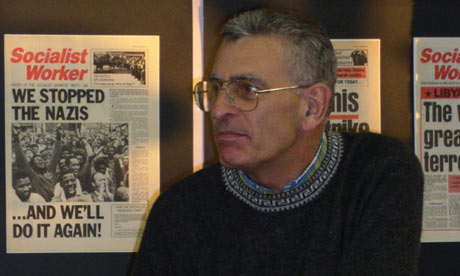
Chris Harman was editor of Socialist Worker for more than 20 years.
MIA > Archive > Harman > Obituaries
From The Guardian, 9 November 2009.
Downloaded with thanks from guardian.co.uk.
Marked up by Einde O’Callaghan for the Marxists’ Internet Archive.
 |
|
Chris Harman was editor of Socialist Worker for more than 20 years. |
|---|
In 2005 Chris Harman was writing about how the 30-year project to publish the collected works of Marx and Engels was done. It is 50 volumes long and he was reviewing Vol.50, having read the previous 49 one by one as they had appeared. Of course, he had read them all. Harman, who has died aged 66 in Cairo, Egypt, following a cardiac arrest, was the kind of Marxist who is never satisfied with second-hand summaries. To get a handle on why he was like this, we have to go back to the 1950s when Marxism was largely in the hands of communists and, as Orwell’s Animal Farm shows, the link between Marx’s ideas and the communist tyrannies was nothing more than a distorted rhetoric.
Harman went to Watford grammar school, with its staff ranging from officer class traditionalists to old Welsh socialists and young CND-ers, the place run by the maverick, leftward-moving Harry Rée. I think I had my first glimpse of him there, as the friend of one of the school’s senior lefties. He headed off to Leeds University in 1961 and became engrossed in a new Marxism, which tried to encapsulate several major bodies of thought, history and action: Marx’s critique of capitalism, the Bolshevik and German revolutions of the early 20th century, a Marxist analysis of the Soviet bloc, and a turn to the revolutionary potential of the different kinds of working class across the world. This was a project that had begun in the 1930s, and Chris made his way to one of the several tiny organisations that had been trying to sustain and develop these ideas: the Socialist Review Group, whose main theorist was Tony Cliff.
In 1964, he moved on to the London School of Economics (LSE) to do a PhD with the present foreign secretary’s father, Ralph Miliband. At the time, revolution was coming from the American civil rights movement, and anti-colonial, anti-apartheid and anti-Vietnam war campaigns. Little did we know that the LSE canteen and the Holborn pubs had turned into a Left Bank of debate. The LSE became a focal point for the sit-ins and free universities in this country.
I remember hearing Chris speak there, one moment alongside Danny Cohn-Bendit, the next with a shop steward from the occupation of the Renault factory in France, another at a demonstration against the Vietnam war. The Socialist Review Group had become the International Socialists (IS). “Neither Washington nor Moscow,” they proclaimed, and many socialists, orthodox Trotskyists and communists recoiled from the hostility Harman directed at the Soviet Union. At one meeting, I recall how it seemed incredible to some that he could support Vietnam’s fight against the US but be critical of Ho Chi Minh’s Communist party. The events in Paris and the rest of France, he would claim, proved the point: existing parties claiming to be Marxist were unwilling and unable to make a revolution.
Everything Chris did over the next 40 years was geared towards creating a political party that was able and willing. With IS and its successor, the Socialist Workers party, he spent his life speaking, writing, editing, organising and campaigning. He was editor of the International Socialism Journal from 2004 and had previously edited Socialist Worker for more than two decades. In conversation his eyes would move between the middle distance and the floor, his ears picking up on every word, his replies indicating that he was relating what you were saying to the library in his head.
He didn’t finish the PhD but produced a constant stream of articles, editorials and books: the book that would become Class Struggles in Eastern Europe (originally published in 1974 as Bureaucracy and Revolution in Eastern Europe), which developed the theory that the Soviet bloc was “state capitalist”; a history of the German revolution in The Lost Revolution: Germany 1918 to 1923 (1983); and the Marxist classic A People’s History of the World (1999). At various times, his articles, which mostly homed in on the economics of the moment, coagulated into books: Explaining the Crisis appeared in 1984, and this year he produced Zombie Capitalism.
His style of speaking was rapid but analytic, good on irony and contradiction; his lifestyle frugal in the extreme. He was untempted by academe or celebrity. It was always a regret and an irritation to me why newspaper and TV debates about wars or the state of global capitalism did not call on him. That was a loss – and to hear that it is a permanent loss is deeply sad. Yet he leaves behind a terrific body of work that challenges received opinion.
He is survived by his partner Talat and children Seth and Sinead.
Last updated on 23 January 2010